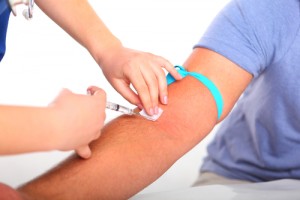Scientists have now developed a simple blood test that can accurately detect the beginning stages of breast and lung cancer in just an hour.Researchers have developed the test that can detect cancer even before symptoms like coughing and weight loss start.
The test works by detecting increased enzyme activity in the body. Iron nanoparticles coated with amino acids and a dye are introduced to small amounts of blood or urine from a patient.The amino acids and dye interact with enzymes in the patient`s urine or blood sample. Each type of cancer produces a specific enzyme pattern, or signature, that can be identified by doctors.
“These enzyme patterns can also help distinguish between cancer and an infection or other diseases that commonly occur in the human body,” researcher Stefan Bossmann said.
“For example, a person who smokes a lot of cigars may develop an inflammation in their lungs. That will drive up some of the markers in the test but not all of them. Doctors will be able to see whether there was too much smoke inhalation or if there is something more serious going on,” he said in a statement.
Once the test is administered, comprehensive results – which include enzyme patterns – are produced in roughly 60 minutes.The researchers have designed a second testing method that is anticipated to produce the same results in about five minutes.
In addition to early detection, the team said the test can be tweaked to monitor cancer. For example, patients being treated with drugs can be observed for drug effectiveness.
Similarly, doctors can use the dye in the test to determine if the entirety of a tumour has been successfully removed from a patient after surgery. Researchers evaluated the test`s accuracy on 32 separate participants in various stages of breast or lung cancer. Data was collected from 20 people with breast cancer – ranging in age from 36 to 81 years old – and 12 people with lung cancer – ranging in age from 27 to 63 years old. Twelve people without cancer were also tested as a control group. This group ranged in age from 26 to 62 years old.
A blood sample from each participant was tested three times. Analysis of the data showed a 95 per cent success rate in detecting cancer in participants, including those with breast cancer in stages 0 and 1 and those with lung cancer in stages 1 and 2
To know more about Cancer Treatment in India please visit this link : https://safemedtrip.com/medical-services/cancer-treatment-in-india.html

 Click to WhatsApp
Click to WhatsApp +91-9899993637
+91-9899993637




